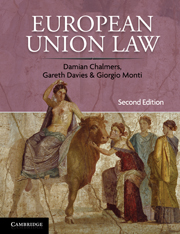Book contents
- Frontmatter
- Contents
- Map
- Preface
- Abbreviations
- Table of Cases
- Table of Treaties, Instruments and Legislation
- Table of Equivalents
- Electronic Working Paper Series
- 1 European Integration and the Treaty on European Union
- 2 The EU Institutions
- 3 Union Law-making
- 4 The EU Judicial Order
- 5 The Authority of EU Law
- 6 Fundamental Rights
- 7 Rights and Remedies in National Courts
- 8 Infringement Proceedings
- 9 Governance
- 10 Judicial Review
- 11 EU citizenship
- 12 EU Law and Non-EU Nationals
- 13 Equal Opportunities Law and Policy
- 14 EU Criminal Law
- 15 External Relations
- 16 The Internal Market
- 17 Economic and Monetary Union
- 18 The Free Movement of Goods
- 19 The Free Movement of Services
- 20 The Pursuit of an Occupation in Another Member State
- 21 Trade Restrictions and Public Goods
- 22 EU Competition Law: Function and Enforcement
- 23 Antitrust and Monopolies
- 24 State Regulation and EU Competition Law
- Index
23 - Antitrust and Monopolies
- Frontmatter
- Contents
- Map
- Preface
- Abbreviations
- Table of Cases
- Table of Treaties, Instruments and Legislation
- Table of Equivalents
- Electronic Working Paper Series
- 1 European Integration and the Treaty on European Union
- 2 The EU Institutions
- 3 Union Law-making
- 4 The EU Judicial Order
- 5 The Authority of EU Law
- 6 Fundamental Rights
- 7 Rights and Remedies in National Courts
- 8 Infringement Proceedings
- 9 Governance
- 10 Judicial Review
- 11 EU citizenship
- 12 EU Law and Non-EU Nationals
- 13 Equal Opportunities Law and Policy
- 14 EU Criminal Law
- 15 External Relations
- 16 The Internal Market
- 17 Economic and Monetary Union
- 18 The Free Movement of Goods
- 19 The Free Movement of Services
- 20 The Pursuit of an Occupation in Another Member State
- 21 Trade Restrictions and Public Goods
- 22 EU Competition Law: Function and Enforcement
- 23 Antitrust and Monopolies
- 24 State Regulation and EU Competition Law
- Index
Summary
INTRODUCTION
In this chapter we review the two principal provisions that implement the competition policy the aims and enforcement structure of which were discussed in Chapter 22: Articles 101 and 102 TFEU. Article 101 applies to agreements between undertakings and declares these agreements void when they are found to restrict competition; Article 102 TFEU applies to dominant undertakings and forbids them from abusing their position. Since the end of the 1990s, the Commission has been engaged in a series of reform initiatives to the application of competition law, in response to criticisms that its approach was insufficiently grounded in economics and was overly aggressive. Explaining and evaluating this process of reform is the central theme of this chapter, which is organised in the following way.
Section 2 covers three legal issues that are common to both Articles: the meaning of an undertaking, the concept of an effect on trade between Member States and judge-made rules that exclude the application of competition law.
Section 3 is a review of the key issues that have arisen in the application of Article 101. It is divided into three parts. First, we explore how this provision applies to activities that undermine the key aims of EU competition law (the protection of the consumer and the integration of markets). In particular we study how this provision tackles cartels, whose agreements cause them to act as a monopoly and reduce consumer welfare.
- Type
- Chapter
- Information
- European Union LawCases and Materials, pp. 962 - 1012Publisher: Cambridge University PressPrint publication year: 2010



